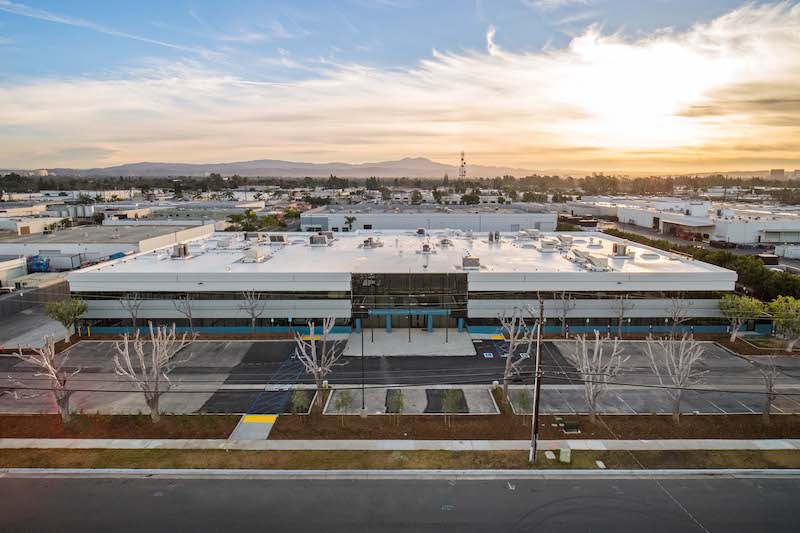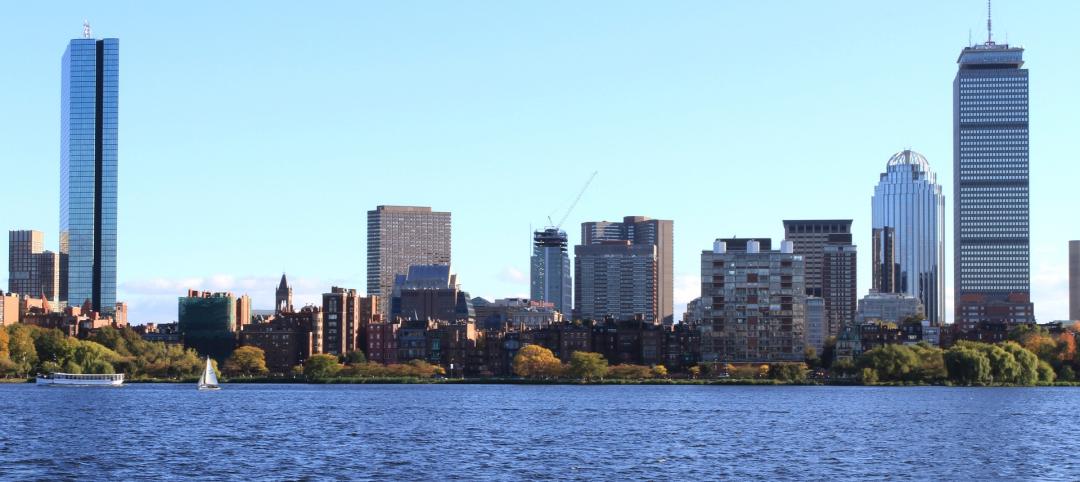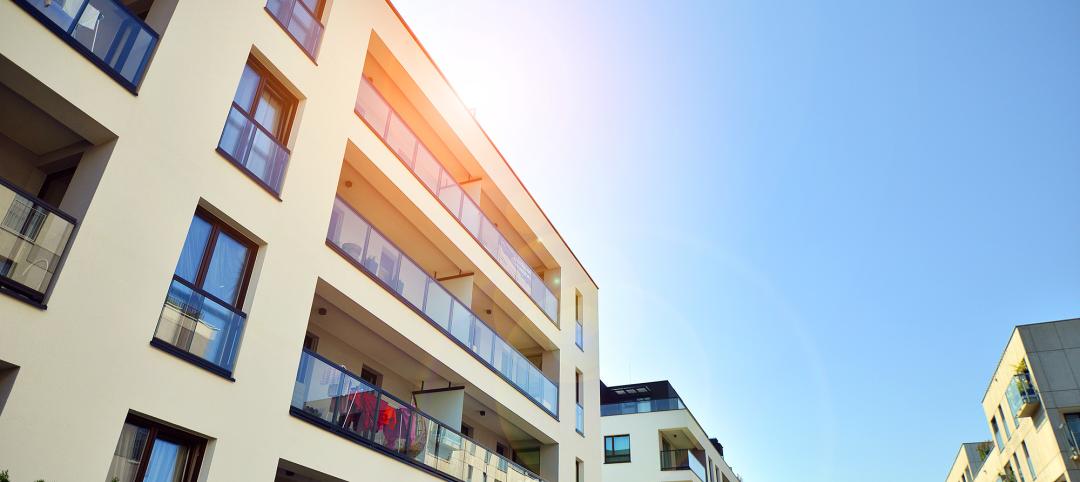On any given day, there are close to 600,000 people who are homeless in the United States, according to estimates by the Department of Housing and Urban Development. The number among those homeless that is unsheltered has been rising since 2016, and now exceeds 226,000.
Sheltering the homeless has always been a NIMBY and political hot potato; witness the brouhaha created when New York City started relocating 8,500 homeless people from many of the 60 vacant hotels they had been moved into temporarily last year because of the coronavirus pandemic. And Boise, Idaho’s Mayor Lauren McLean has named 19 citizens to a taskforce she created in response to what’s been reported as fierce neighborhood opposition to Interfaith Sanctuary’s plan to build a homeless shelter on that city’s State Street.
But the need for more homeless shelters is undoubtedly evident, growing, and national, impacting metros large and small.
A hotel previously used by the City of Austin, Texas, as a COVID-19 isolation center is set to open in August as the second bridge shelter for people experiencing homelessness in the state’s capital, where there’s been a noticeable increase in people living in outdoor tents.
In Anchorage, Ala., there’s been pressure to decommission a mass shelter by this fall, with Mayor Dave Bronson proposing a large new facility, costing $15 million, that would accommodate up to 450 people, and whose development would be informed by what’s worked (and what hasn’t) in markets like Reno, Nev., and San Francisco. And the City Council in Phoenix has just awarded two local organizations—Central Arizona Shelter Services (CASS) and Community Bridges—$8 million to open homeless shelters in west and northwest Phoenix. CASS would use its portion of that grant to buy and adapt an existing hotel.
AEC FIRMS GET INVOLVED IN SHELTER PROJECTS
This crisis would seem to be an opportunity for the AEC industry, just as the COVID-19 outbreak stimulated any number of new ideas for creating safe, emergency healthcare, education, and living spaces. One of AIA’s Small Project awards this year was The Community First! Village Micro House, designed by McKinney York Architects as a non-towable tiny house for a homeless person. It was built in Austin as part of a community of tiny houses that provides shelter to the homeless.
Earlier this week, California Gov. Gavin Newsom visited LifeMoves Mountain View, a modular housing community that opened on May 27 in Mountain View, Calif., and, as part of California’s HomeKey program, provides temporary housing and resources for up to 124 homeless people.
LifeMoves Mountain View, a transitional homeless shelter in northern California built by XL Construction, used 48 shipping containers for 100 living units. Images: Courtesy of XL Construction
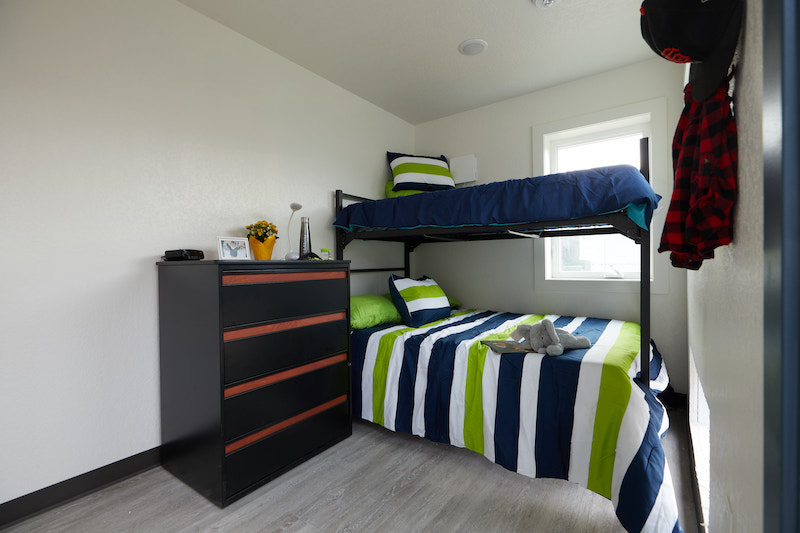
The 100-unit facility was designed by Charles Bloszies, FAIA, a San Francisco-based architect. Sares Regis Group Northern California was the Project Manager. XL Construction was the GC. Other building team members were BKF Engineers (CE), ARUP (MEPF), and WEST Environmental (environmental engineer). Connect Homes (individual units), Urban Bloc (dining, bathrooms, laundry), Falcon Structures (case management and support service rooms), and Indie Dwell (family units) provided 48 shipping containers with 100 doors that created the living spaces within this 43,560-sf facility on one acre, 30% of which is dedicated to support services delivery.
“This project strikes at the core of our mission to ‘build to improve lives,’ ” says XL’s vice president Craig Ellis.
According to XL Construction, the modular structures were ready for habitation in less than 180 days from when construction commenced last December. The facility’s amenities include private locking units for each household, meeting and case management rooms, green spaces and gardens, laundry facilities, food prep and services, 19 onsite and 30 offsite parking spaces, playground, dog kennels, a children’s education center, and family services support buildings.
LifeMoves, the largest provider of interim housing and services for homelessness in Silicon Valley, expects to serve about 350 people in its new facility’s first year, more than half of Mountain View’s current homeless population.
NEW FACILITY IS A STEP TOWARD PERMANENT HOUSING
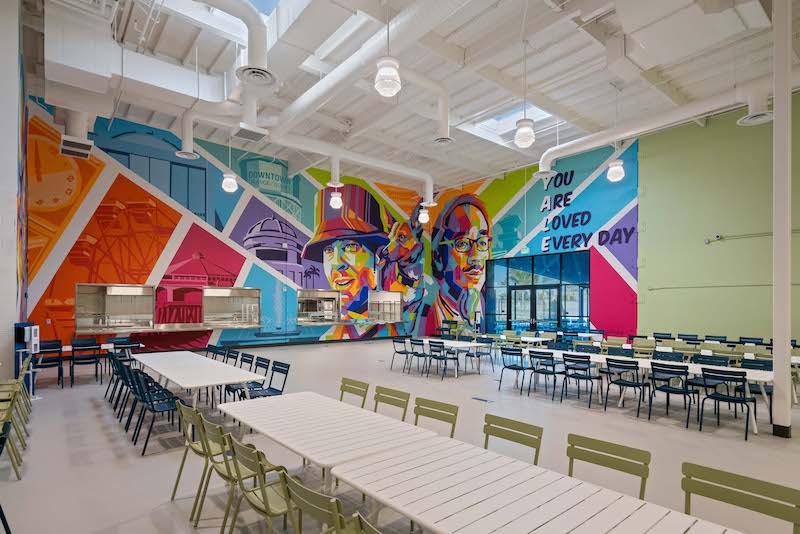
The dining hall at Yale Navigation Center in Santa Ana, Calif., one of that facility's many services. Image: JunTang Photography.com
In Santa Ana, Calif., the general contractor C.W. Driver Companies just completed the 64,000-sf Yale Navigation Center, a two-story emergency homeless shelter that will provide refuge for 275 single men, 100 single women, and 25 couples. The navigation center is set up to help homeless people transition into permanent housing and self-sufficiency.
The facility, which is an adaptive reuse of an existing warehouse-manufacturing building, features two living and sleeping options: 6x6-ft single cubicles for individuals and 8x9-ft stations for couples. The units are furnished and have storage spaces. All stations have twin-sized beds and meet ADA standards for accessibility. The facility includes women and men’s dorms, restrooms, showers, a dining hall, kitchen, outdoor patio and dining area, clinic space, and classrooms.
C.W. Driver Companies worked with the architecture firm IDS Group to complete this $25 million project. The shelter is operated by People Assisting the Homelessness (PATH). The project was spearheaded by HomeAid Orange County, a nonprofit dedicated to building new lives for families and individuals experiencing homelessness. The navigation center will provide permanent year-round 24-hour shelter, and basic needs like meals and sanitary amenities, while creating a pathway to permanent supportive housing.
Its support services include case management, employment and housing assistance, behavioral and mental healthcare support and substance abuse treatment. For security purposes, the facility will enforce strict no walk-up, no walk-out and no-loitering policies. Prospective residents must be referred to staff by outreach workers, law enforcement, or a hospital. Applicants with outstanding warrants or sex offences will not be granted access.
“Ending homelessness in Orange County is attainable with a housing-first approach,” says Jason Austin, Orange County’s director of care coordination. There are between 7,000 and 10,000 homeless in Orange County, and the Yale Navigation Center replaces an open-air bus terminal in Santa Ana’s Civic Center, which had been the city’s largest shelter.
Related Stories
Mixed-Use | Oct 7, 2024
New mixed-use tower by Studio Gang completes first phase of San Francisco waterfront redevelopment
Construction was recently completed on Verde, a new mixed-use tower along the San Francisco waterfront, marking the end of the first phase of the Mission Rock development. Verde is the fourth and final building of phase one of the 28-acre project that will be constructed in several phases guided by design principles developed by a design cohort led by Studio Gang.
MFPRO+ News | Sep 24, 2024
Major Massachusetts housing law aims to build or save 65,000 multifamily and single-family homes
Massachusetts Gov. Maura Healey recently signed far-reaching legislation to boost housing production and address the high cost of housing in the Bay State. The Affordable Homes Act aims to build or save 65,000 homes through $5.1 billion in spending and 49 policy initiatives.
MFPRO+ News | Sep 23, 2024
Minnesota bans cannabis smoking and vaping in multifamily housing units
Minnesota recently enacted a first-in-the-nation statewide ban on smoking and vaping cannabis in multifamily properties including in individual living units. The law has an exemption for those using marijuana for medical purposes.
The Changing Built Environment | Sep 23, 2024
Half-century real estate data shows top cities for multifamily housing, self-storage, and more
Research platform StorageCafe has conducted an analysis of U.S. real estate activity from 1980 to 2023, focusing on six major sectors: single-family, multifamily, industrial, office, retail, and self-storage.
Mixed-Use | Sep 19, 2024
A Toronto development will transform a 32-acre shopping center site into a mixed-use urban neighborhood
Toronto developers Mattamy Homes and QuadReal Property Group have launched The Clove, the first phase in the Cloverdale, a $6 billion multi-tower development. The project will transform Cloverdale Mall, a 32-acre shopping center in Toronto, into a mixed-use urban neighborhood.
Codes and Standards | Sep 17, 2024
New California building code encourages, but does not mandate heat pumps
New California homes are more likely to have all-electric appliances starting in 2026 after the state’s energy regulators approved new state building standards. The new building code will encourage installation of heat pumps without actually banning gas heating.
Adaptive Reuse | Sep 12, 2024
White paper on office-to-residential conversions released by IAPMO
IAPMO has published a new white paper titled “Adaptive Reuse: Converting Offices to Multi-Residential Family,” a comprehensive analysis of addressing housing shortages through the conversion of office spaces into residential units.
MFPRO+ Research | Sep 11, 2024
Multifamily rents fall for first time in 6 months
Ending its six-month streak of growth, the average advertised multifamily rent fell by $1 in August 2024 to $1,741.
Legislation | Sep 9, 2024
Efforts to encourage more housing projects on California coast stall
A movement to encourage more housing projects along the California coast has stalled out in the California legislature. Earlier this year, lawmakers, with the backing of some housing activists, introduced a series of bills aimed at making it easier to build apartments and accessory dwelling units along California’s highly regulated coast.
MFPRO+ New Projects | Sep 5, 2024
Chicago's Coppia luxury multifamily high-rise features geometric figures on the façade
Coppia, a new high-rise luxury multifamily property in Chicago, features a distinctive façade with geometric features and resort-style amenities. The 19-story, 315,000-sf building has more than 24,000 sf of amenity space designed to extend resident’s living spaces. These areas offer places to work, socialize, exercise, and unwind.


